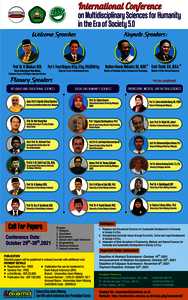Zulhuda, Sonny (2021) Society 5.0 , datafication and the illusion of lawlessness. In: International Conference on Multidisciplinary Sciences for Humanity in the Era of Society 5.0, 29 - 30 October 2021, Virtual. (Unpublished)
|
PDF (Plenary Presentation)
- Presentation
Restricted to Registered users only Available under License Creative Commons Attribution Non-commercial. Download (3MB) | Request a copy |
||
![[img]](http://irep.iium.edu.my/93589/2.hassmallThumbnailVersion/UNISMA%20Conference%20Oct%202021.jpg)
|
PDF (Event poster and schedule)
- Supplemental Material
Download (214kB) | Preview |
Abstract
The obsession of Society 5.0 as launched by the Government of Japan in 2016 is to incorporate modern technologies such as Big Data, the Internet of Things (IoT), robotic technology and Artificial Intelligence in all industries and social activities to achieve both economic development and solutions to social problems in parallel. The ongoing transformation of the information society has indeed guaranteed the dynamic in the society. Businesses, governance, works, education, social bonding and family values are being redefined in the wake of the massive adoption of digital technologies. This transformation, which had begun long before the launching of Society 5.0 itself, often leaves us with many legal questions that remain unanswered. Despite efforts by parliaments and judiciary worldwide in regulating the digital transformation and its legal consequences, we still see the dynamic that keeps our society preoccupied. Looking at these legal concerns will get us more prepared when shifting to this Society 5.0. Legal anomalies such as the spread of hoaxes and online scams, breach of digital privacy, abuse of personal data for pecuniary gains, and online predatory behaviour are haunting our shared space and may eventually hinder the full benefit of the datafication. Behind these anomalies is the false sense of unassailability of the Internet, i.e. the belief that cyberspace is a lawless space. The absence of physical presence of authority, among others, leads to this myth of anonymity, hence the wrongdoing and crimes are committed. This false sense of unassailability of the Internet, if ignored, will only become the continuing source of more anomalies in future. In this keynote, and drawing from some high-profile cases, the author discusses this false sense of unassailability that led to the illusion of lawlessness, absolute freedom of expression, and data abuses in the context of the information society. It also incites some preliminary thoughts on what can be done to address the concern. The author hopes this will further raise the interest of fellow researchers to work on this area in future.
| Item Type: | Proceeding Paper (Plenary Papers) |
|---|---|
| Uncontrolled Keywords: | Society 5.0, Data fication, Digitalisation, Anarchy, Cyberspace |
| Subjects: | B Philosophy. Psychology. Religion > BP Islam. Bahaism. Theosophy, etc > BP1 Islam > BP173.63 Islam and civil society BPL Islamic education K Law > K Law (General) K Law > K3150 Public law K Law > KBP Islamic Law > KBP1 Islamic law.Shariah.Fiqh > KBP480 Conflict of laws T Technology > T Technology (General) > T55.4 Industrial engineering.Management engineering. > T58.5 Information technology T Technology > T Technology (General) > T55.4 Industrial engineering.Management engineering. > T58.6 Management information systems |
| Kulliyyahs/Centres/Divisions/Institutes (Can select more than one option. Press CONTROL button): | Ahmad Ibrahim Kulliyyah of Laws Ahmad Ibrahim Kulliyyah of Laws > Department of Civil Law |
| Depositing User: | Dr Sonny Zulhuda |
| Date Deposited: | 15 Dec 2021 16:33 |
| Last Modified: | 17 Mar 2022 15:19 |
| URI: | http://irep.iium.edu.my/id/eprint/93589 |
Actions (login required)
 |
View Item |


 Download Statistics
Download Statistics Download Statistics
Download Statistics